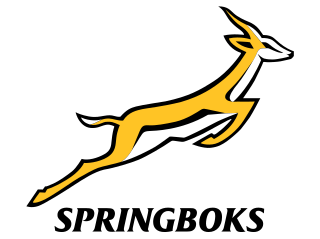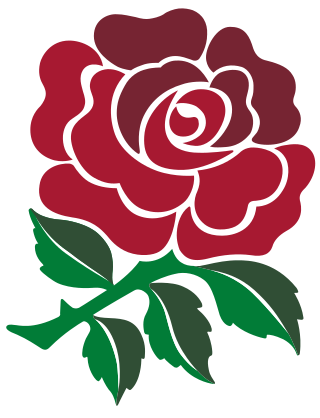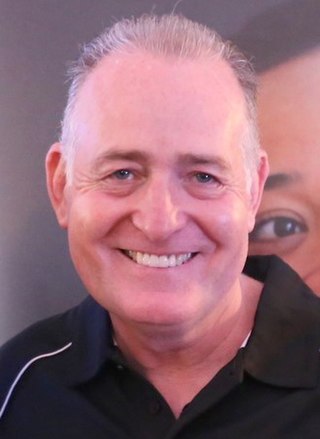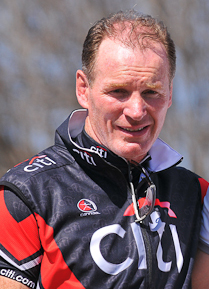
The British & Irish Lions is a rugby union team selected from players eligible for the national teams of England, Ireland, Scotland, and Wales. The Lions are a test side and most often select players who have already played for their national team, although they can pick uncapped players who are eligible for any of the four unions. The team tours every four years, with these rotating between Australia, New Zealand and South Africa in order. The most recent test series, the 2021 series against South Africa, was won 2–1 by South Africa.

The New Zealand national rugby union team, commonly known as the All Blacks, represents New Zealand in men's international rugby union, which is considered the country's national sport. Famed for their international success, the All Blacks have often been regarded as one of the most successful sports teams in history.

The South Africa national rugby union team, commonly known as the Springboks, is the country's national team governed by the South African Rugby Union. The Springboks play in green and gold jerseys with white shorts, and their emblem is the Springbok, a native antelope and the national animal of South Africa. The team has represented South African Rugby Union in international rugby union since 30 July 1891, when they played their first test match against a British Isles touring team. Currently, the Springboks are the top-ranked rugby team in the world and reigning World Champions, having won the World Cup a record four times. South Africa have won half of the Rugby World Cups they have participated in and are also the second nation to win the World Cup consecutively.

The Australia men's national rugby union team, nicknamed the Wallabies, is the representative men's national team in the sport of rugby union for the nation of Australia. The team first played at Sydney in 1899, winning their first test match against the touring British Isles team.

The England men's national rugby union team represents the Rugby Football Union in men's international rugby union. They compete in the annual Six Nations Championship with France, Ireland, Italy, Scotland and Wales. England have won the championship on 29 occasions, winning the Grand Slam 14 times and the Triple Crown 26 times, making them the most successful outright winners in the tournament's history. They are currently the only team from the Northern Hemisphere to win the Rugby World Cup, having won the tournament in 2003, and have been runners-up on three further occasions.

The Wales national rugby union team represents the Welsh Rugby Union in men's international rugby union. Its governing body, the Welsh Rugby Union (WRU), was established in 1881, the same year that Wales played their first international against England. The team plays its home matches at the Millennium Stadium in Cardiff, which replaced Cardiff Arms Park as the national stadium of Wales in 1999.
The 1997 British Lions tour to South Africa was a series of matches played by the British Lions rugby union team in South Africa. This tour followed the Lions' 1993 tour to New Zealand and preceded their 2001 tour to Australia. The much-anticipated tour was the first after the end of apartheid in South Africa, and the first Lions tour since rugby union turned professional. It was only the third time that a touring side had won a test series in South Africa; the others being the 1974 Lions and the 1996 All Blacks.

David Ian Campese, AM, also known as Campo, is a former Australian rugby union player (1982–1996), who was capped by the Wallabies 101 times, and played 85 Tests at wing and 16 at fullback.
Gary Hamilton Teichmann is a retired South African professional rugby union player. He played number eight and captained the South African national team, the Springboks, between 1995 and 1999.

Simon Paul Poidevin is a former Australian rugby union player. Poidevin made his Test debut for Australia against Fiji during the 1980 tour of Fiji. He was a member of the Wallabies side that defeated New Zealand 2–1 in the 1980 Bledisloe Cup series. He toured with the Eighth Wallabies for the 1984 Australia rugby union tour of Britain and Ireland that won rugby union's "grand slam", the first Australian side to defeat all four home nations, England, Ireland, Wales and Scotland, on a tour. He debuted as captain of the Wallabies in a two-Test series against Argentina in 1986, substituting for the absent Andrew Slack. He was a member of the Wallabies on the 1986 Australia rugby union tour of New Zealand that beat the All Blacks, one of six international teams and second Australian team to win a Test series in New Zealand. During the 1987 Rugby World Cup, he overtook Peter Johnson as Australia's most capped Test player against Japan, captaining the Wallabies for the third time in his 43rd cap. He captained the Wallabies on a fourth and final occasion on the 1987 Australia rugby union tour of Argentina before injury ended his tour prematurely. In 1988, he briefly retired from international rugby, reversing his decision 42 days later ahead of the 1988 Bledisloe Cup series. Following this series, Poidevin returned to the Australian side for the single 1989 Bledisloe Cup Test. He returned full-time to the Australian national squad for the 1991 season. Poidevin was a member of the Wallabies that won the 1991 Rugby World Cup, after which he retired from international rugby union.
A World XV is a rugby union team organised on an unofficial, ad hoc basis and typically composed of invited players from various countries. Several World XVs have been arranged by various bodies since the 1970s, often to take part in celebration and testimonial games, usually against national teams, but these are not considered test matches by most nations.
Bob Lindner is an Australian former professional rugby league footballer who played in the 1980s and 1990s, and coached in the 1990s. An Australia national and Queensland State of Origin representative forward, he is one of a handful of players to be named man-of-the-match in State of Origin football more than once. Fifteen years after his retirement from football in Australia, he had made the most appearances and scored the most tries of any forward in State of Origin history.

The 1921 South Africa rugby union tour of Australia and New Zealand was the third tour made by the Springboks rugby team, and their first tour to Australia and New Zealand. South Africa played three Test matches against the All Blacks. The series was drawn 1–all, and the long-running controversy between the countries over the All Blacks' inclusion of Maori players began.
The 1988 Australia rugby union tour of England, Scotland and Italy was a series of fifteen matches played by the Australia national rugby union team in England, Scotland and Italy from October to December 1988. The Wallabies won eleven of their matches and lost the other four; they lost to England in their first international match but beat Scotland in the second and concluded the tour with a further international win over Italy.
The 1993 South Africa rugby union tour of Australia was a series of matches played by the Springboks in Australia during July and August 1993. It was the first tour of the South African team to Australia since the riots of controversial tour of 1971.
The 1994 South Africa rugby union tour of Britain and Ireland was a series of matches played in October and November 1994 in Britain and Ireland by South Africa national rugby union team. The Springboks played two Test matches on the thirteen match tour and won both.
The 1996 South Africa rugby union tour of Argentina and Europe was a series of rugby union matches played during November and December 1996 in Argentina, France and Wales by the South Africa national rugby union team.

In 1992, the South Africa Springboks played a rugby union test match against the New Zealand All Blacks, which later became known as the Return Test. The match was played at Ellis Park Stadium in Johannesburg on 15 August 1992. It was named as the Return Test as it was South Africa's first test match since the International Rugby Football Board (IRFB) had banned them due to apartheid.
Hugh Meredith Reece-Edwards is a former South African rugby union player. His regular playing position was Full-Back.
The 1992 South Africa rugby union tour of France and England was a series of matches played in October and November 1992 in France and England by the South Africa national rugby union team. The 1992 tour was South Africa's first tour to France since 1974 and to England since 1969–70.









